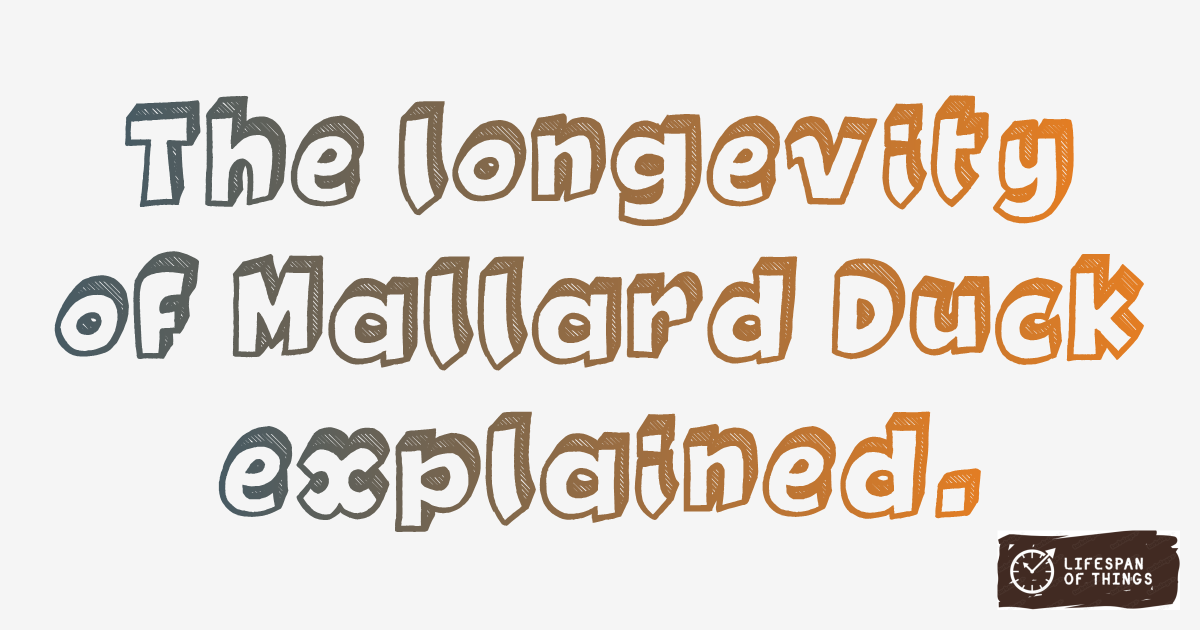
10 - 15 Years
Lifespan of Mallard Duck is 10 - 15 Years. Mallard ducks have a lifespan of 10-15 years, influenced by factors like environment, diet, and predator presence. Keeping them in a safe habitat with access to water and suitable vegetation can enhance their longevity. Offering a balanced diet rich in grains, seeds, plants, and occasional insects contributes to their overall health and lifespan. Predation, habitat loss, and pollution are factors that can affect the lifespan of Mallard Ducks, emphasizing the importance of conservation efforts.
Useful Information
Mallard ducks inhabit a variety of wetland habitats, including ponds, lakes, marshes, and rivers. They prefer areas with ample vegetation for nesting and foraging, along with open water for swimming. Mallards are adaptable to different climates but thrive in temperate regions with suitable nesting sites.
Learn about the importance of wetland habitats for waterfowl and the unique ecosystems they support.
The diet of Mallard Ducks consists of aquatic plants, seeds, grains, insects, and small invertebrates. They also consume agricultural crops like wheat, barley, and corn. Offering a diverse diet rich in nutrients is essential for their nutritional needs and overall health. Avoid feeding Mallards bread or other unhealthy human foods that can be harmful to their digestive system.
To care for Mallard Ducks and promote their well-being, provide a clean water source for swimming and drinking. Regularly clean their habitat to prevent the spread of diseases. Avoid using pesticides near their habitat to protect their health. Monitoring their behavior for signs of distress or illness allows for early intervention to improve their lifespan. Engaging in conservation efforts to protect wetland habitats benefits Mallard Ducks and other waterfowl species.
Mallard Ducks exhibit social behaviors and communicate through various vocalizations and body movements. They are generally not trainable like domesticated pets but can become familiar with human presence in certain environments. Handling Mallards with care and respect their natural instincts to maintain their trust. Understanding their behaviors and respecting their space contributes to their overall well-being and longevity.
Mallard Ducks are classified as a species of least concern in terms of conservation status. However, threats to their populations include habitat loss due to urban development, pollution of waterways, and hunting. Conservation efforts focus on preserving wetland habitats, regulating hunting practices, and monitoring populations to ensure their sustainability. Educating the public about the importance of protecting waterfowl species contributes to the long-term survival of Mallard Ducks.
Lifespan Comparisons
| Compared Item | Comparison Description |
|---|---|
| Lifespan of Canada Goose | The Mallard Duck and the Canada Goose have a similar lifespan, lasting around 10-15 years on average. |
| Lifespan of Swan | Compared to the Mallard Duck, Swans also live approximately 10-15 years, showcasing similar longevity in the animal kingdom. |
| Lifespan of Wood Duck | Wood Ducks, like Mallard Ducks, have a lifespan of around 10-15 years, making them comparable in terms of longevity. |
| Lifespan of Pintail Duck | While Mallard Ducks live 10-15 years, Pintail Ducks have a slightly shorter lifespan of 5-10 years on average. |
| Lifespan of Turtles | In contrast to Mallard Ducks, Turtles have a significantly longer lifespan, living for 100-150 years on average. |
| Lifespan of Frogs | Frogs, with a lifespan of 5-10 years, have a shorter life expectancy compared to Mallard Ducks. |
| Lifespan of Exotic Reptiles | Exotic Reptiles and Mallard Ducks share a similar lifespan of approximately 10-15 years, making them comparable in terms of longevity. |
| Lifespan of Green Iguana | The Green Iguana outlasts the Mallard Duck, with a lifespan exceeding 15 years on average. |
| Lifespan of Earth | While Mallard Ducks live 10-15 years, the Earth has an incomprehensibly long lifespan ranging from billions to trillions of years. |
| Lifespan of Mars | Mars, unlike the Mallard Duck, has a lifespan of 10-15 years due to its unique planetary environment. |
| Lifespan of Jupiter | Jupiter, with a lifespan of 10000-15000 days, has a much shorter lifespan compared to Mallard Ducks. |
| Lifespan of Venus | Mallard Ducks and Venus share a similar lifespan of approximately 10-15 years, showcasing consistency in longevity. |
| Lifespan of Saturn | Saturn, like the Mallard Duck, has a lifespan of around 10-15 years, making them comparable in terms of longevity. |
| Lifespan of Moon (Earth) | In contrast to Mallard Ducks, the Moon (Earth) has a lifespan of 10000-15000 years, significantly longer in comparison. |
| Lifespan of Europa (Jupiter) | The Europa (Jupiter), with a lifespan of 10-15 light years, showcases a unique lifespan compared to the Mallard Duck in astronomical terms. |
Frequently Asked Questions
Lifespan of Mallard Duck is 10 - 15 Years.
A balanced diet for Mallard Ducks consists of aquatic plants, seeds, grains, insects, and small invertebrates.
Provide clean water sources, avoid pesticides, and monitor their behavior for signs of distress.
Mallard ducks inhabit wetland habitats such as ponds, lakes, marshes, and rivers with ample vegetation and open water.
Conservation efforts help protect wetland habitats, regulate hunting practices, and monitor populations to ensure their sustainability.








